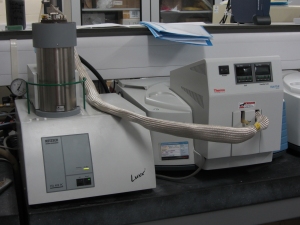Differential Scanning Calorimetry determines variations in the sample materials composition, crystallinity and oxidation. It also determines the materials glass transition temperature, melting point, energy absorbed and energy released. This is found by measuring specific heat capacity, heat of transition, temperature of phase changes and melting points. The differences in heat flow between the sample material and known reference materials are then compared against one another.
 DSC involves using sensors with a high calorimetric sensitivity, short time constants and a condensation-free chamber. This results in high detection sensitivity and reliable baselines over the life span of a calorimeter.
DSC involves using sensors with a high calorimetric sensitivity, short time constants and a condensation-free chamber. This results in high detection sensitivity and reliable baselines over the life span of a calorimeter.
Differential Scanning Calorimetry is the most commonly used thermal analysis technique that can be used on a range of materials including: polymers, plastics, composites, laminates, adhesives, coatings, rubbers and more.
Thermal analysis techniques offered by ITA Labs include:
If you’re looking for a differential scanning calorimetry service, ITA Labs’ UK Laboratory is highly experienced and has the expertise to help you interpret the results, whilst providing a reliable service and fast turnaround at very competitive rates.
To discuss your potential requirements, call Mark on 01727 871316.
Mark Dowling

+44 (0) 1727 871 316